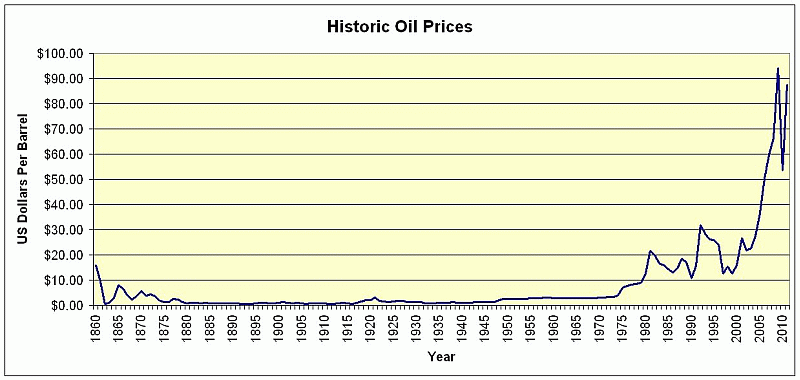Every IFS report is based on the projections of future oil prices, years and decades ahead, issued by the Office of Budget Responsibility. Helpfully, Alistair Darling is on the record as describing how the the British government uses the OBR in a way that renders it "not just...part of the Government but...part of the Conservative Party". In any event, the British government has been woefully inept at predicting oil prices in the past, as a matter of demonstrable historic fact:
It has also regularly been out of step with the estimates of industry itself and a host of other organisations:
"Current projections from a wide range of organisations are largely upward. The ITEM Club forecast price rises over $130 a barrel; as does the Department for Energy in the UK. NIESR, the Economist Intelligence Unit and the US Energy Information Administration all forecast rises above $110 a barrel. The UK Government’s newly formed OBR – which Alistair Darling accused of being a front for the Conservative Party – is isolated in predicting a price fall."
Since the above was written (December 2013) prices will have fluctuated. They go up and down. Estimates of future prices will have been revised. The economic crash led to a temporary dramatic drop in the price of oil between 2008 and 2010 but did Norway go bust? No, it did not. Norway's economy is much more reliant on oil than Scotland's (29% of GDP compared to our 16%) but it didn't miss a beat. Norway has - literally - too much money, so much that it doesn't know what to do with it. And it's not rocket science. You just recognise that a high price today may not be high forever, assume that there will be some years of a temporary fall in income and don't splurge it all in the good years. Does that sound too simple? Well. The prices of many things go up and down and are a lot more volatile than the price of oil.
You have to ask: if onion farmers can make a living by budgeting for price volatility, can't nations?
Beyond all the politics and scaremongering about oil price fluctuation, the real point is a common sense and obvious one: what, do we think, is most likely to happen in general to the price of a scarce resource on which all modern economies are founded and for which the world thirsts?
I couldn't immediately find a more recent graph and in fact the price has been remarkably stable since it quickly recovered in 2010. Today, Brent crude is trading at around $109 a barrel and has been around that level for some years.
And price is just part of it. A vital aspect to the potential for an independent Scotland of North Sea oil over the coming decades is the level of reserves:
"According to the UK Oil & Gas 2013 Economic Report, there are substantial volumes of North Sea oil and gas remaining. Current programs have already identified 11.4 billion barrels. With future exploration, the UK regulator estimates the levels to range between 15-24 billion barrels."So. What does the industry itself think? How confident of a return on investment are the oil companies themselves? Here's a chart showing applications for exploration licenses to 2012:
Some years back, Dr. Richard Pike, a former oil industry consultant and then the chief executive of the Royal Society of Chemistry, estimated that the North Sea reserves would last 100 years but you don't need to be that optimistic to see the vast opportunities just waiting for an independent Scotland. In what was described as "the biggest independent review of the North Sea oil and gas industry in its history", Sir Ian Wood's report at the end of last year said that Scotland is on the verge of a second oil boom.
The British government has been keen to remind us that the oil is "running out", to knowingly and falsely understate its potential, from the moment the first drop came ashore. Had we known 40 years ago just how long that process would take, and what unimaginably vast wealth it would generate in the meantime, maybe we'd have paid a bit more attention and given a bit more thought to the question of who should do what, for whom, with that wealth. We don't have that excuse now.
Only independence will allow us to maximise and utilise the benefits that will accrue from the second half of the oil boom in a way that makes up for the mess made of the first. In a way that means we will be able to look our children in the eye.





As a staunch advocate of Scottish independence I would like to thank the author(s) for this bit of common sense journalism in a, lets face it, JK Rowling, Free for all climate of mis leading propaganda & rhetoric!
ReplyDeleteThe other thing this story fails to mention is that it is believed we have untapped well of Brent Crude down off the West Coast near Helensburgh ect.
It is, however FACT that off the far North West Coast, almost a straight kine out from Inverness WE as a Nation have vast untapped reserves. Up until now the oil companies have been reluctant to do the exploration due to, the depth and strong currents ect. But it would seem Wee Aleck will offer them tax breaks and incentive to do the exploration.
As an independent nation, not only are we self sustainable.......
We are WEALTHY!